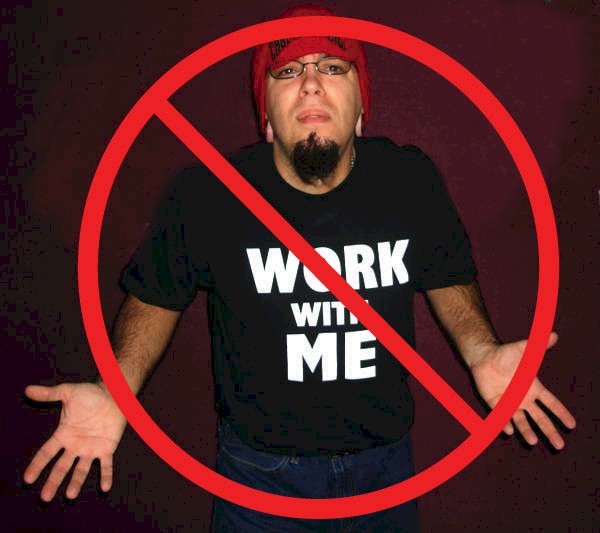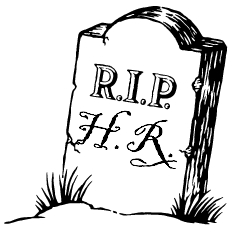Not content to promise more than he can deliver, and still happy to charge money for nothing (that you can’t get elsewhere for free), TheLadders’ CEO Marc Cenedella conducts an inspection of his members with his latest missive:
“So my colleagues here at TheLadders and I want to make your job search strategy as attractive as you are as a professional. We want to help you emphasize what makes you a better person for the position than all the other applicants — your search should be as special as you are.
“Are you doing the most to make yourself stand out? Are you taking the right steps to make yourself more attractive?”
Translation: Why haven’t you turned yourself out as a job slut, using the visual aids we recently put on TV?
 But then Cenedella pushes them into a big, dark, deep hole in the ground:
But then Cenedella pushes them into a big, dark, deep hole in the ground:
“If you’ve been looking for a job recently, you’ve discovered the ugly truth: job boards are broken.
“They don’t work, they don’t help, and they aren’t getting you where you need to go. Sure it sounds nice in theory — making it so easy to apply to jobs for anybody from anywhere at any time.”
Gimme a break. TheLadders is a job board! Cenedella smears lipstick on his customers and tells them to whore themselves out, tries to paint his own job board another color, then he tells you he’s the one honest pimp on the street, but don’t mind the kaka on his shoes while he steps all over his competitors… and shoves your job search into his money pit. Keep reading his e-mails and you’ll get used to the smell… Hey, many in HR have gotten used to it. That’s how TheLadders survives.
I shouldn’t waste my time (or yours) on TheLadders, but The Cynical Girl (aka, Laurie Ruettimann, who started, then killed, the provocative PunkRockHR) just slapped TheLadders silly (TheLadders is the single biggest piece of crap) on her new blog, and she sticks the pig with panache. Laurie sez:
“If you are a recruiter or HR professional who cannot find talented workers without using a chump-ass job board like The Ladders… If you are a job seeker and you want to earn $100,000 or more, don’t throw good money after bad… skip The Ladders… don’t be a dumbass.”
Sorry, M.C., but no matter how you try to dress it up, your pig is just another job board.
Who else is calling out TheLadders, and calling out the dumbasses that use it? You might wonder why few pundits are talking about what TheLadders is doing. It’s simple: TheLadders buys their silence with sponsorships and ad campaigns.
Example: During a radio appearance in March, 2010, I had a candid conversation with Brian Lehrer on New York Public Radio about Job-board scams, and we pointedly discussed the angry dissatisfaction of Ladders customers. Brian got a little nervous and suggested that he should bring TheLadders on the show to defend itself.
(In 2009, I appeared on WNYC several times, including for a weekly special summer series about job hunting. The series was so successful that WNYC rebroadcast the “best of Ask The Headhunter” while the Lehrer show was on summer hiatus.)
WNYC never got around to that debate between TheLadders and me, but I was never asked on again. Coincidence? Maybe. I do a lot of radio, and I know that scheduling is affected by all sorts of things. But, earlier today, an Ask The Headhunter “regular” pointed out to me that TheLadders is now a sponsor of WNYC public radio. Coincidence?
Maybe. But when I see almost 100 comments posted on an article about TheLadders: Job-board salary fraud?, and over 200 comments posted on an article about The Dope on TheLadders, and when Ladders customers clamor for investigations of the company by states attorneys general, I’ve gotta wonder… just how long can TheLadders keep the lid on this controversy and stay in business?
The answer to that is: Personnel Jockeys. Corporate HR departments continue to dump untold millions into TheLadders, mindlessly seeking “ONLY $100k+ candidates,” even though any sixth-grade math whiz could tell them that the baseline odds of finding such people is so small that dumpster-diving for them at TheLadders or in any other job board is a waste of money. (Actually, an experienced CFO has tried to explain this, too. But HR gets its advice from high-priced HR consultants who really, really believe in online job boards.)

Laurie Ruettimann is a respected, no-holds-barred practitioner, observer and critic of the recruiting/HR world who calls it as she sees it. But there’s little competition on the topic of TheLadders. The pundits who might speak up seem either reticent or terrified. Some of them have already been bought and shut down.
Then there are the “HR experts” — apologist fans like Kris Dunn, who regularly tout TheLadders as the second coming of True Recruiting: True Confession: I love TheLadders and The Ladders: Now Providing a Free, Continuous Posting To Every Recruiter In the World… But I think TheLadders is digging its own grave. (Sorry, Kris, but not every recruiter in the world wants to be buried in that database.)
So, Cynical Girl, welcome to the fray. This is actually an easy public service. You hold the bright light of public scrutiny in Marc Cenedella’s face, and watch the HR profession hand him the shovel while he digs this pig’s grave.
.
 Comments on I really, really want this job, a discussion about frustrated job hunters, turned back to the problem of employers that fail to display the most basic courtesies.
Comments on I really, really want this job, a discussion about frustrated job hunters, turned back to the problem of employers that fail to display the most basic courtesies.


 I’ve known a handful of people who have actually worked for a few days at no charge, to show an employer that they are really expert at the work. (In every case, the person got the job, and also got paid for the time they invested. Why would anyone even try this if they weren’t 100% confident of the outcome?) But it wasn’t because the employer asked them to — it was because they suggested it. It was never a case of, Do the work, or you get no interview.
I’ve known a handful of people who have actually worked for a few days at no charge, to show an employer that they are really expert at the work. (In every case, the person got the job, and also got paid for the time they invested. Why would anyone even try this if they weren’t 100% confident of the outcome?) But it wasn’t because the employer asked them to — it was because they suggested it. It was never a case of, Do the work, or you get no interview. But then Cenedella pushes them into a big, dark, deep hole in the ground:
But then Cenedella pushes them into a big, dark, deep hole in the ground:
 This is another example of how the HR function is increasingly devoted to dumbing down the organization. To HR, salary increases are routine, based on longevity. You might as well be working for the government.
This is another example of how the HR function is increasingly devoted to dumbing down the organization. To HR, salary increases are routine, based on longevity. You might as well be working for the government. HR has planned its own funeral by engineering itself out of the recruiting and hiring business. HR is now all about picking millions of burrs out of its ass after sitting down in — no, change that, after buying its way into — the job-board weed patch. HR has surrounded itself with everyone it doesn’t want, and now it’s spending precious corporate dollars to get rid of what it bought.
HR has planned its own funeral by engineering itself out of the recruiting and hiring business. HR is now all about picking millions of burrs out of its ass after sitting down in — no, change that, after buying its way into — the job-board weed patch. HR has surrounded itself with everyone it doesn’t want, and now it’s spending precious corporate dollars to get rid of what it bought. The Joke: Two elephants are sitting in a bathtub, scrubbing away. One elephant pauses and cries out to the other, “Pass the soap!” And the other elephant shouts back, “No soap! RADIO!”
The Joke: Two elephants are sitting in a bathtub, scrubbing away. One elephant pauses and cries out to the other, “Pass the soap!” And the other elephant shouts back, “No soap! RADIO!”